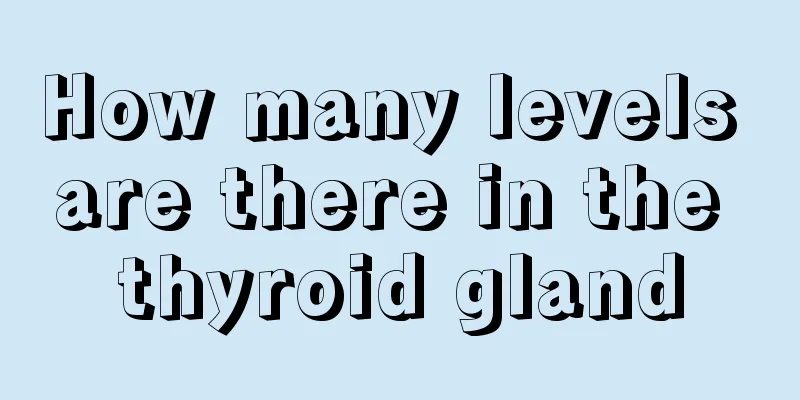How many levels are there in the thyroid gland

|
Thyroid diseases have become more common in recent years, and the thyroid gland is a very important tissue for our human body. There are many problems with the thyroid gland, and these problems also have certain levels of difference. The clinical manifestations of different levels are also different, and its shape is also different. However, many people do not know its specific level. So how many levels are there for the thyroid gland? The thyroid gland (Latin: Glandula thyr(e)oidea; English: Thyroid) is a very important gland in vertebrates and an endocrine organ. In mammals it is located below the thyroid cartilage in the neck, on both sides of the trachea. The human thyroid gland is shaped like a butterfly and is like a shield, hence the name. The thyroid gland controls how quickly energy is used, makes proteins, and regulates the body's sensitivity to other hormones. The thyroid gland regulates these responses by producing thyroxine, triiodothyronine (T3) and thyroxine, also known as tetraiodothyronine (T4). Both regulate metabolism, growth rate, and regulate other body systems. T3 and T4 are synthesized from iodine and tyrosine. The thyroid gland also produces calcitonin, which regulates calcium balance in the body. Grade 1: Regularly shaped round or oval anechoic nodules with no blood flow signals inside. Common in thyroid cysts, Intracystic hemorrhage in adenoma. Grade 2: Regularly shaped cystic-solid mixed echogenic nodules with blood flow signals in the solid part. It is more common in follicular adenomas and adenomatous nodules. Grade 3: Uniform solid echo nodules with regular shapes, sometimes with microcalcifications visible in the capsule or nodules, and abundant blood flow inside. It is more common in follicular adenomas, adenomatous nodules, and differentiated carcinomas. Grade 4: Irregularly shaped solid echo nodules, sometimes with microcalcifications visible in the capsule or nodules, and abundant blood flow inside. More common in differentiated carcinoma. Grade 5: Solid echogenic nodules with irregular shapes and extraglandular infiltration; microcalcifications may sometimes be seen in the capsule or nodules, with abundant blood flow inside. More common in differentiated carcinoma. Signs of canceration of thyroid nodules under ultrasound include: lack of halo sign; solid hypoechoic; echo heterogeneity; irregular margins; microcalcifications; extraglandular infiltration; and internal high blood flow. |
<<: The advantages and disadvantages of washing your face with a facial puff
>>: Spread after thyroid puncture
Recommend
What are the causes of colon cancer
Colon cancer is the disease with the highest inci...
Experts remind you of several early symptoms of skin cancer
Skin cancer is a dermatological disease that many...
What are the symptoms of rectal cancer
What are the symptoms of rectal cancer? Early sta...
What are some tips for removing oil from the face?
In real life, oily facial skin is a very annoying...
How to make short and thick fingers thinner
Slender fingers make people look very beautiful a...
How to take care of skin cancer
Skin cancer is a serious skin disease. Generally,...
Basic knowledge about melanoma
Melanoma is prone to recurrence, so melanoma pati...
How should gastrointestinal disorders be treated?
The occurrence of gastrointestinal disorders will...
What is the best treatment for glioma
Glioma is a highly harmful brain tumor that is pr...
How do people who have been heartbroken get over it?
Broken heart is something that everyone will inev...
Where is the thigh tendon
In our lives, we all know that when we massage, t...
How to detect atherosclerosis?
Atherosclerosis is not unfamiliar to many people....
Surgical treatment is the main method for the treatment of bladder cancer
There are many treatments for bladder cancer now,...
Can cervical vertebrae cause dizziness?
Cervical spondylosis is a relatively common disea...
Is onion juice effective for washing hair?
Onion is a good thing, because onion has very hig...









